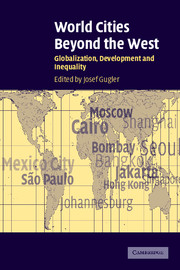Book contents
- Frontmatter
- Contents
- List of figures
- List of maps
- List of tables
- List of contributors
- Acknowledgments
- World cities beyond the West
- Introduction
- Part 1 The impact of the global political economy
- Part 2 The impact of the state
- 6 Moscow's changing fortunes under three regimes
- 7 Hong Kong's pathway to becoming a global city
- 8 Singapore: forming the family for a world city
- 9 Jakarta: globalization, economic crisis, and social change
- Part 3 The impact of popular movements
- Afterword
- Index
- References
7 - Hong Kong's pathway to becoming a global city
Published online by Cambridge University Press: 12 October 2009
- Frontmatter
- Contents
- List of figures
- List of maps
- List of tables
- List of contributors
- Acknowledgments
- World cities beyond the West
- Introduction
- Part 1 The impact of the global political economy
- Part 2 The impact of the state
- 6 Moscow's changing fortunes under three regimes
- 7 Hong Kong's pathway to becoming a global city
- 8 Singapore: forming the family for a world city
- 9 Jakarta: globalization, economic crisis, and social change
- Part 3 The impact of popular movements
- Afterword
- Index
- References
Summary
Hong Kong, like Singapore, seems to be quite different from the other cities that we discuss in this volume. This is because Hong Kong is not just a city, but also a quasi “city-state” (Kirby 1997, p. iii). Even in the colonial era, the Hong Kong government was highly autonomous in determining its own political, economic, and social affairs, and Hong Kong was an independent member in such a global organization as the Asia Pacific Economic Cooperation. In addition, Hong Kong is a rich city. Its gross domestic product (EDP) per capita of over US$24,211 in 2001 made it one of the richest territories in the Asian region. Furthermore, unlike the other cities in this volume that aspired to be a global city, Hong Kong has already attained the status of a global city. Hong Kong is ranked the ninth largest trading entity in the world. It operates the busiest container port in the world in terms of throughput, and it is the world's ninth largest banking center in terms of external banking transactions (Hong Kong Government 1999).
Hong Kong resembles Singapore in some aspects, but it had a different path of development. In Singapore, independence took place before development, and it was the independent city-state that elevated Singapore to the global city status. In Hong Kong, development took place before decolonization. It was the colonial government that elevated Hong Kong to the global city status in the 1980s and the 1990s.
- Type
- Chapter
- Information
- World Cities beyond the WestGlobalization, Development and Inequality, pp. 212 - 239Publisher: Cambridge University PressPrint publication year: 2004
References
- 5
- Cited by

